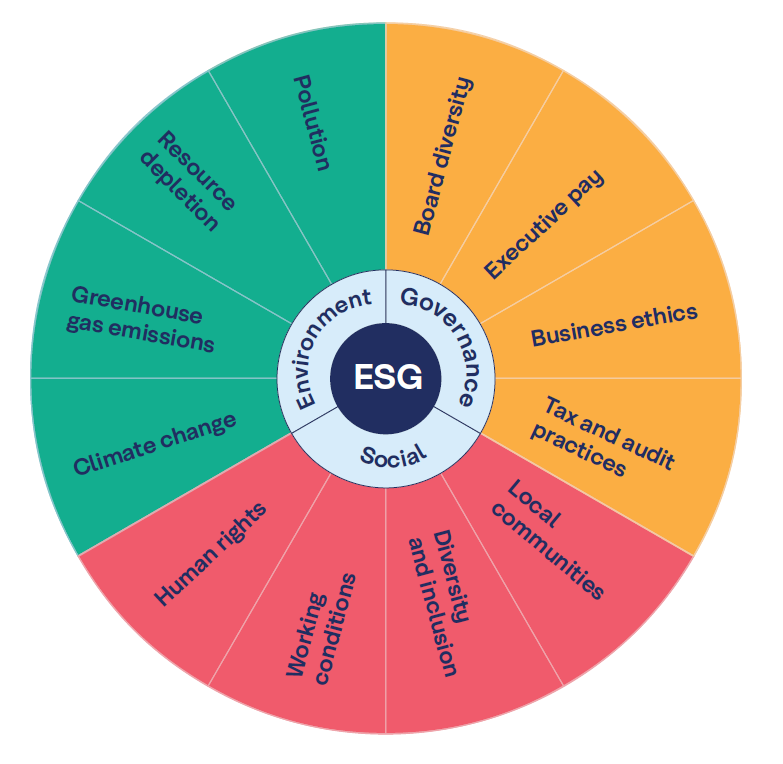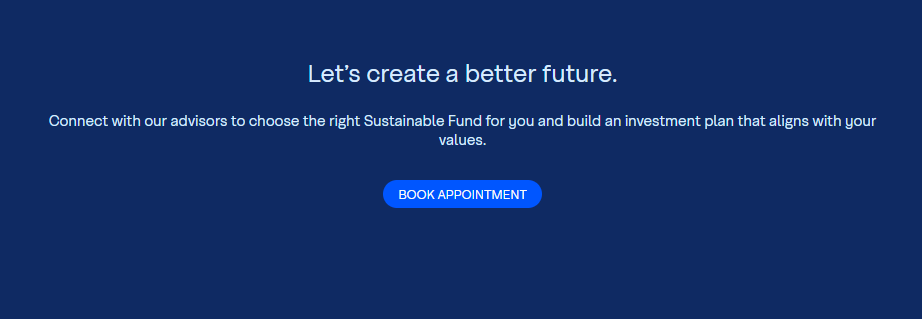Environmental, Social and Governance (ESG) investing refers to a set of standards investors use to screen companies based on their behaviour. It’s a scoreboard to guide your investment choices based on your values–but what does that mean for your financial goals? ESG investment funds have seen rapid growth in the past 5 years and are increasingly seen not just as “the right thing to do” but a smart financial move for companies and investors alike. In partnership with Guardian Capital, here’s a closer look at why we believe that organizations that prioritize ESG standards will achieve better long-term sustainable growth relative to organizations that ignore or downplay these practices.
ESG and investment decision making.
ESG factors are non-financial considerations upon which to assess companies, and investors are increasingly taking notice and including these factors in their investment decision making processes. There is sometimes a misconception, however, that ESG and sustainable investing is a consideration separate from the financial returns of an investment. While many ESG issues are not yet found in the financial statements issued by companies, it does not mean they are not relevant from a financial performance standpoint. Examples of ESG issues include but are not limited to:

Seeing ESG through a financial lens.
The concept of business risk is commonly accepted by all investors today. Business risk is the exposure a company has to factors that would negatively impact its financial performance. Business risk, if not managed, can result in a number of negative outcomes for a company including a loss of customers, equipment deterioration, legal liability and more. When investors are evaluating a company to invest in, it is important to understand the business risks that companies face. Another consideration when assessing business risk is the risks from ESG issues.
Take for example the environmental issue of greenhouse gas (GHG) emissions in the automobile industry. The ability for companies to design and manufacture cars with lower emissions serves an important need for reducing our environmental footprint but there is also a related business risk associated with failing to meet a government regulator’s emissions standards. The most well-known example of this comes from Volkswagen. In 2015, the United States Environmental Protection Agency found that Volkswagen cheated on the emissions tests for its diesel vehicles in order to meet US carbon emissions standards. The scandal, referred to as “Dieselgate”, ended up costing Volkswagen $35 billion in fines and damages and resulted in significant negative impacts to its reputation. For investors in the company’s stock, Volkswagen’s share price fell by more than 40% following the news of the scandal.
Viewed in this context, ESG factors can be seen as a source of business risk and ultimately financial performance. Companies need to be cognizant of and properly manage these ESG-related risks as they would any other business risk.
Managing ESG risk.
The practice of assessing how ESG-related risk (and opportunities) may affect a company’s financial performance is commonly referred to as ESG Integration, where ESG factors are looked at alongside other traditional financial and business considerations to form a holistic evaluation of a company.
Not all ESG factors are relevant for all companies. For example, having a sustainable practice for waste management would be more material for a company producing physical goods than a technology company that provides software services. To properly evaluate a company, there needs to be an understanding of what is important for the industry in which it operates.
Like any other business risk, being exposed to ESG-related risk is a reality of doing business but that does not mean all companies within an industry have the same approach to sustainability. Investment managers focus their research on the sustainability profile of each company and assess how well that company is managing its ESG-related risk. Our partners at Guardian believe that business organizations that engage in sustainable environmental practices, consider the effects of their operations on the communities in which they operate, and have proper governance practices that protect the interests of all stakeholders, will achieve better long-term sustainable growth relative to organizations that downplay or ignore these practices. Additionally, as a company better manages its ESG-related risks, it improves its overall long-term sustainability profile which goes hand-in-hand with improving its long-term profitability.
Sustainable Funds.
The Sustainable Funds, managed and offered by Guardian Capital LP*, are diversified investment solutions that offer Coast Capital members the opportunity to build and preserve wealth while contributing to a sustainable world.
The funds:
- Are broadly diversified, actively managed investment portfolios
- Are focused on maintaining above average sustainability ratings
- Offer you the choice of six different portfolios to best meet your individual risk tolerance
- Allow you to invest alongside active managers that aim to deliver sustainable returns through sustainable solutions
Responsible investing is not just a consideration for the Sustainable Funds – it is a requirement.
The Sustainable Funds only include underlying fund managers that uphold the highest principles of responsible investing (UNPRI signatories) and underlying funds that have demonstrated effective ESG integration through high sustainability ratings. In addition, the funds look to invest in thematic funds focused on companies making improvements in social or environmental areas such as clean energy or healthy lifestyles.
![]()
The stuff we have to say.
This article is provided for general information purposes only. It is not to be relied upon as financial, tax, or investment advice or guarantees about the future, nor should it be considered a recommendation to buy or sell. Information contained in this article, including information relating to interest rates, market conditions, tax rules, fees, and other investment factors are subject to change without notice and Coast Capital Savings Federal Credit Union is not responsible to update this information. All third party sources are believed to be accurate and reliable as of the date of publication and Coast Capital Savings Federal Credit Union does not guarantee accuracy or reliability of such sources. Readers should consult their own professional advisor for specific financial, investment, and tax advice tailored to their needs to ensure that individual circumstances are considered properly and action is taken based on the latest available information. Coast Capital Savings Federal Credit Union provides advice and service related to deposit, loan and mortgage products. Coast Capital Wealth Management Ltd provides investment and financial planning services. Worldsource Financial Management Inc. provides advice and service relating to mutual funds.
*Guardian Capital LP is a signatory of the United Nations-supported Principles of Responsible Investment (UN PRI). The UN PRI does not prescribe the exclusion of any particular type of company or industry; rather it requires that, as the Manager, we are informed on the ESG issues, and that we are comfortable with the activities and practices of the companies that we invest in. Our Responsible Investing policies are publicly available on our website at https://www.guardiancapital.com/
Investment solutions/responsible-investing/ Responsible investing is an approach to investing that incorporates ESG considerations into investment decisions. This approach may incorporate considerations beyond traditional financial information into the investment selection process, which could result in investment performance deviating from other products with comparable objectives or from broad market benchmarks.
Guardian’s Sustainable Funds have ESG-related investment objectives, while other Guardian Mutual Funds and ETFs do not have ESG-related investment objectives. All Guardian Funds integrate ESG considerations into the investment analysis of all holdings within their respective portfolio. A Fund’s ESG characteristics and performance may change from time to time. Please review the Fund’s prospectus for details on how the Fund’s investment strategy incorporates responsible investing considerations and the associated risks, and consult your financial professional prior to investing.
The Fund’s Morningstar Sustainability ratings, rankings and scores evaluate the ESG aspects of the Fund’s portfolio holdings and do not evaluate the efficacy of the Fund’s ESG investment strategies and are not indicative of how well ESG considerations are integrated by the Fund. Please note that a Fund will not be assigned a fund-level ESG rating or ranking by Morningstar if it is new or does not have a sufficient enough portion of its holdings qualified for rating according to Morningstar’s Sustainability Rating for Fund Methodology. The full rating methodology employed by Morningstar can be found on their website or by clicking on the following link: https://www.morningstar.com/content/dam/marketing/shared/research/methodology/744156_Morningstar_Sustainability_Rating_for_Funds_Methodology.pdf. A copy of the Morningstar Sustainability Rating for Fund Methodology may be obtained, free of charge, by contacting us at 1 (866) 383-6546 or insights@guardiancapital.com. Other providers may also prepare ESG ratings and rankings of mutual funds and ETFs based on their own methodologies, which may differ from the methodology employed by Morningstar.
A copy of the Fund’s prospectus or the 12 month history of the Fund’s Morningstar Sustainability rating, rankings and scores based on the Morningstar Sustainability Rating for Funds Methodology may be obtained, free of charge, by contacting us at 1 (866) 383-6546 or insights@guardiancapital.com or by visiting our website at: www. guardiancapital.com/investmentsolutions and https://www.guardiancapital.com/investmentsolutions/esg-historical-data/, respectively.




